2020
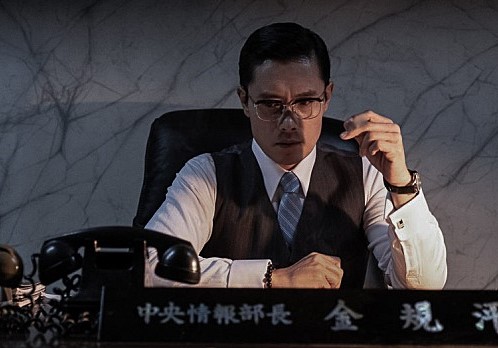
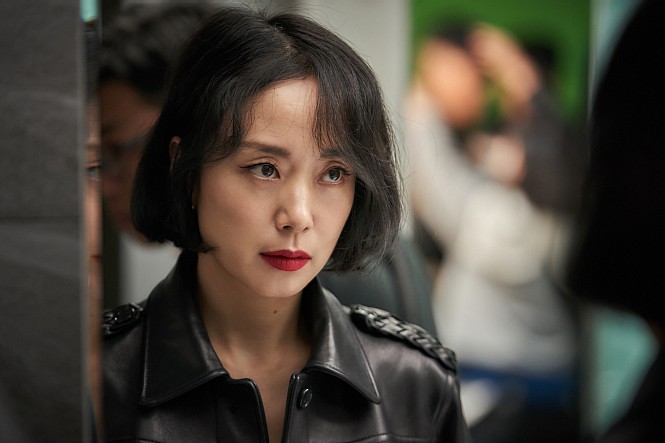
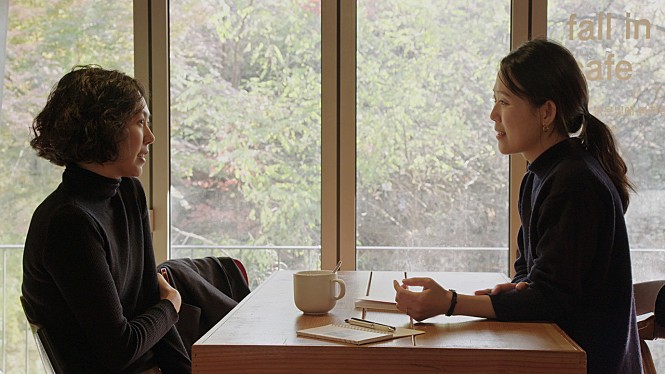
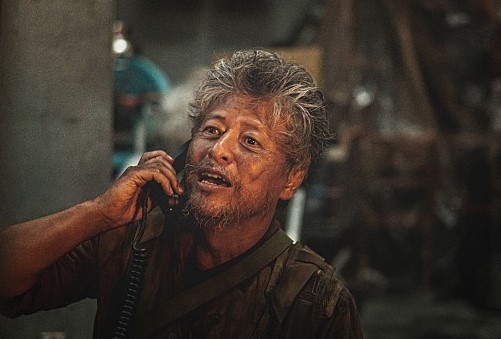
"The Man Standing Next", "Beasts Clawing at Straws", "The Woman Who Ran", "Peninsula"
Who could have predicted the highs and lows of 2020? In February, all of Korea celebrated Bong Joon Ho's triumph at the Oscars, when Parasite carried home Best Picture, Best Director, Best Original Screenplay and Best International Film. Just weeks later, Hong Sangsoo won a Best Director award at Berlin for his highly praised The Woman Who Ran. But everyone knows what happened next: the global pandemic brought the film industry to a screeching halt. Korea's theaters never closed down entirely, but concerns about the virus and a lack of new releases kept admissions down throughout the year. Only occasionally did the box office show signs of life, particularly in the summer with the release of blockbusters Peninsula and Deliver Us From Evil, but each time new outbreaks led to steep drops in ticket sales. Overall, box office was down about 70% on the previous year.
Reviewed below: Secret Zoo (Jan 15) - The Man Standing Next (Jan 22) - The Closet (Feb 5) - Beasts Clawing at Straws (Feb 19) - Lucky Chan-sil (Mar 5) - Hotel Lake (Apr 29) - Deliver Us from Evil (Aug 5) - OK! Madam (Aug 12) - Please Don't Save Me (Sep 10) - Night of the Undead (Sep 29) - Voice of Silence (Oct 15).
| Korean Films | Admissions | Release | Revenue | |
|---|---|---|---|---|
| 1 | The Man Standing Next | 4,750,345 | Jan 22 | 41.2bn |
| 2 | Deliver Us From Evil | 4,357,803 | Aug 5 | 38.6bn |
| 3 | Peninsula | 3,812,250 | Jul 15 | 33.1bn |
| 4 | Hitman: Agent Jun | 2,406,232 | Jan 22 | 20.6bn | 5 | #Alive | 1,903,992 | Jun 24 | 16.0bn | 6 | Steel Rain 2: Summit | 1,791,533 | Jun 24 | 14.7bn |
| 7 | Pawn | 1,719,521 | Sep 29 | 14.8bn |
| 8 | Samjin Company English Class | 1,571,286 | Oct 21 | 14.0bn |
| 9 | Honest Candidate | 1,536,682 | Feb 12 | 12.8bn |
| 10 | Collectors | 1,523,514 | Nov 4 | 13.8bn |
| All Films | Admissions | Release | Revenue | |
|---|---|---|---|---|
| 1 | The Man Standing Next (Korea) | 4,750,345 | Jan 22 | 41.2bn |
| 2 | Deliver Us From Evil (Korea) | 4,357,803 | Aug 5 | 38.6bn |
| 3 | Peninsula (Korea) | 3,812,250 | Jul 15 | 33.1bn |
| 4 | Hitman: Agent Jun (Korea) | 2,406,232 | Jan 22 | 20.6bn |
| 5 | Tenet (US) | 1,992,214 | Aug 26 | 18.4bn | 6 | #Alive (Korea) | 1,903,992 | Jun 24 | 16.0bn | 7 | Steel Rain 2: Summit (Korea) | 1,791,533 | Jun 24 | 14.7bn |
| 8 | Pawn (Korea) | 1,719,521 | Sep 29 | 14.8bn |
| 9 | Dolittle (US) | 1,607,082 | Jan 8 | 13.5bn |
| 10 | Samjin Company English Class (Korea) | 1,571,286 | Oct 21 | 14.0bn |
Revenue is in Korean currency (US$1=~1200 won).
Source: Korean Film Council (www.kobis.or.kr).
Seoul population: 9.8 million
Nationwide population: 51.8 million
A training lawyer Kang Tae-su (Ahn Jae-hong, Fabricated City) is fresh out of law school and working in an elite firm. Diligent, deferential but ambitious, he desperately wants to be promoted to a trade specialist (MNA, or Master Netting Agreement, specialist, to be exact). Thanks to his efforts to "protect" the Representative of the firm (Park Hyuk-kwon, The Mimic) from angry protesters, he is given an opportunity to manage a soon-to-be-closed countryside zoo called Dongsan Park. If he could revitalize the zoo and increase its resale value before it could be bought up by a foreign company, he would be rewarded with the coveted partnership. However, when Tae-su arrives at Dongsan Park, he finds that most animals have already been sold off in order to pay for the debt. Due to strict regulations about animal importation, there is simply no way he could replenish the animals in time to re-open the institution. The remaining staff, keepers Geon-wook (Kim Seong-oh, Door Lock) and Hae-gyoung (Jeon Yeo-bin, After My Death), the skeptical veterinarian So-won (Kang So-ra, Sunny) and the deflated, guilt-ridden director Mr. Seo (Park Young-gyu, How to Use Guys with Secret Tips), are ready to give up and move on. However, Tae-su, burning with ambition, will have none of this defeatism. He comes up with a crazy idea to bring customers back to the zoo, with the "technological help" from Mr. Go (Kim Gi-cheon, The Wailing), a special effects artist for film production, and somehow cajoles and nags the staff to try it out.
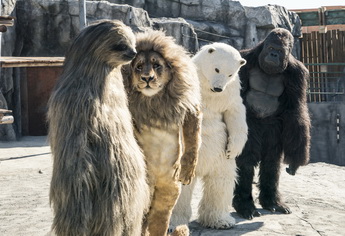 Secret Zoo is a rare kind of South Korean comedy that treats its entirely, unsparingly, seriously preposterous premise (based on a webtoon by HUN, the author of Secretly, Greatly) with an almost soothing level of gentility and wit. I began watching the film not knowing its director and was pleasantly intrigued by its unhurried pace and compassionate treatment of its personages, devoid of the mean-spiritedness often infusing many "comical" characters in Korean cinema. When I found out that the film was Son Jae-gon's follow-up project to 2010's Villain and Widow, these traits made a perfect sense. It is good to observe that Son has lost none of his strengths displayed in the aforementioned Han Seok-kyu & Kim Hye-soo vehicle as well as his debut feature My Scary Girl (2006). Perhaps even risking the prospect of losing a portion of his viewers, he refuses to turn his film into a lugubrious critique of a jungle called the Korean capitalist system and financial predators nesting inside it, or the kind of "popular" comedy from which the viewers could derive sadistic pleasures out of watching its characters cussing and bashing one another.
Secret Zoo is a rare kind of South Korean comedy that treats its entirely, unsparingly, seriously preposterous premise (based on a webtoon by HUN, the author of Secretly, Greatly) with an almost soothing level of gentility and wit. I began watching the film not knowing its director and was pleasantly intrigued by its unhurried pace and compassionate treatment of its personages, devoid of the mean-spiritedness often infusing many "comical" characters in Korean cinema. When I found out that the film was Son Jae-gon's follow-up project to 2010's Villain and Widow, these traits made a perfect sense. It is good to observe that Son has lost none of his strengths displayed in the aforementioned Han Seok-kyu & Kim Hye-soo vehicle as well as his debut feature My Scary Girl (2006). Perhaps even risking the prospect of losing a portion of his viewers, he refuses to turn his film into a lugubrious critique of a jungle called the Korean capitalist system and financial predators nesting inside it, or the kind of "popular" comedy from which the viewers could derive sadistic pleasures out of watching its characters cussing and bashing one another.
Indeed, the biggest compliment I could pay to Son's writing and direction is that, when Tae-su's openly ludicrous "plan" actually unfolds, there is little tonal shift from the earnestly dramatic (yet also knowingly funny) scenes of the young lawyer's struggle to be noticed by his firm's head honcho in the first act. The ensemble acting by a competent cast is coordinated by Son's unpretentious direction to convey the main characters' earnestness and commitment, even as they navigate through uproariously bizarre situations, such as running away from an interloper while pretending to be a six-foot tall sloth (Why a sloth? And why so big? You have to see the movie to figure that out).
Secret Zoo makes an exceedingly clever use out of one of contemporary Korean cinema's secret weapons: special makeup effects. TSA Cell's Hwang Hyo-gyun (Train to Busan, Svaha: The Sixth Finger, Parasite) was entrusted with the challenging task of coming up with animal suits for the cast that walks the tightrope between Hollywood-level realism and Halloween-party-costume chintziness, and he did a fabulous job. The actors dressed in these suits look alternately completely ridiculous, surprisingly charming and, occasionally even menacing and dignified, all the while accurately conveying their emotions via eloquent body movements coupled with carefully modulated voice acting. In fact, this actors-in-the-special-makeup-suits conceit brings a strange level of conviction to the antics of the "animal actors." They are so effective that the zoo's major animal character, a disturbed polar bear named Blacknose, rendered through in itself not-bad CG effects, simply cannot hold water to the suited actors: the supposedly "real" bear looks a lot "faker" than the Coke-sipping Mr. Seo in a polar bear suit. I actually wish that Hwang had been given a sufficient budget to construct a polar bear to be augmented with CG effects, as he was apparently able to do with the baseball-playing gorilla in Mr. Go.
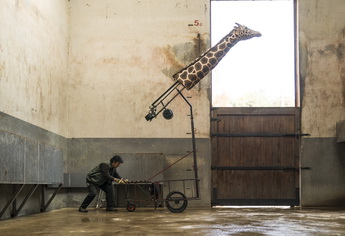 Although the film is in essence an ensemble piece, Ahn Jae-hong (probably best known for playing a law school student-turned-chef in the hit TV series Reply 1988 [2015-2016]) firmly anchors it, essaying a basically decent and hardworking thirtysomething guy, an ingenious problem solver with a conscience. The rest of the cast is also game, and the film's romantic subplots are never allowed to distract the viewers from appreciating the sense of teamwork and mutual respect that develops between Tae-su and the zoo staff. The zoo itself was persuasively rendered through a composite of many location shots and the newly constructed, fairly elaborate sets standing in for the open quarters for a polar bear and a gorilla, supervised by Production Designer Kim Hyun-ok (Always). Particularly notable is Lee Gang-hee's (the award-winning editor of Exit) editing, that nimbly cuts together the long shots of actors in animal suits from the spectator's POV and the closer shots of their slapstick antics to maintain the illusion of real animals in repose or various states of activity.
Although the film is in essence an ensemble piece, Ahn Jae-hong (probably best known for playing a law school student-turned-chef in the hit TV series Reply 1988 [2015-2016]) firmly anchors it, essaying a basically decent and hardworking thirtysomething guy, an ingenious problem solver with a conscience. The rest of the cast is also game, and the film's romantic subplots are never allowed to distract the viewers from appreciating the sense of teamwork and mutual respect that develops between Tae-su and the zoo staff. The zoo itself was persuasively rendered through a composite of many location shots and the newly constructed, fairly elaborate sets standing in for the open quarters for a polar bear and a gorilla, supervised by Production Designer Kim Hyun-ok (Always). Particularly notable is Lee Gang-hee's (the award-winning editor of Exit) editing, that nimbly cuts together the long shots of actors in animal suits from the spectator's POV and the closer shots of their slapstick antics to maintain the illusion of real animals in repose or various states of activity.
Some among the English-speaking readers who have reached this point in my review might wonder, wait, didn't you just say that the polar bear in Dongsan Park is disturbed? And don't you think the reason that this poor animal is in such a state is the fact that, well, he had to live his life in a prison? Perhaps you might be wondering whether director Son and his screenwriting team (Lee Yong-jae, Heo Seong-hye and Kim Dae-woo, director of Obsessed and The Servant) would simply jettison this issue of animal welfare from the movie. Not to worry. I do not want to spoil the ending of the film, but in a way reminiscent of Bong Joon Ho's Okja, it admirably attempts to strike the balance between a pragmatic, narratively sensible solution and a feel-good fantasy, transporting Tae-su and So-won to an ethereal, almost science fictional space, even though still based on a real-life institution. True, this balancing act between realism and fantasy does falter a bit toward the final reel, but I am willing to give the filmmakers high marks for trying.
Even though Secret Zoo sold a total of 1.22 million tickets through the New Year season of 2020, pretty decent for such a beguiling, unassuming entry, it was ultimately not enough for the film to break even commercially. It was also pummeled by bad reviews from media critics and derisive put-downs from internet wags, some of whom no doubt preferred to see a "whackier (read: loud and sadistic)" comedy. I, on the other hand, really appreciated the film's laid-back approach and fundamentally humane and thoughtful characterizations, which, by the way, are extended to the treatment of the animals appearing in it, whether fake or "real." Secret Zoo is not an easy film to peg down: if you could imagine an early '60s Disney comedy starring, say, Fred McMurray, but wrangled by someone with distinctively contemporary sensibilities (Noah Baumbach?) as well as deliberately droll "retro" special effects, that might approximate its flavor. I can understand why it might not be someone's cup of tea, but I nonetheless recommend it heartedly to any fan of Korean cinema willing to try out a comedy of different stripes. (Kyu Hyun Kim)
1979. The KCIA director Kim Gyu-pyeong (Lee Byung-hun, Magnificent Seven, Ashfall) is a trusted right-hand man to the South Korean dictator President Park (Lee Seong-min, The Beast). When his friend and the former KCIA honcho Park Yong-gak (Gwak Do-won, The Wailing) threatens to expose the records of human rights abuses and other dirty secrets of the Park regime to the US Congress, Kim is put in a tight spot. He becomes increasingly concerned that President Park is putting too much trust in the sociopathic, violent sycophant Gwak Sang-cheon (Lee Hui-jun, Miss Baek), Chief of Security Service, having been deeply disturbed by his pal's warning that both of them are merely expendable tools to the President. When the pro-democracy activism ignites a civic uprising in Busan and the President agrees with Chief Gwak that a martial law and possibly lethal suppression of the protesters should be implemented, Kim has to decide what is the right course of action for himself and for the nation.
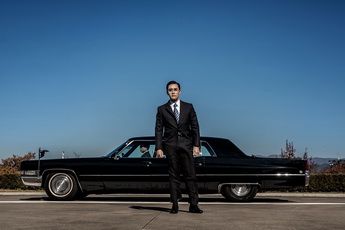 Director Woo Min-ho, who co-authored the screenplay with Lee Ji-min (The Age of Shadows), has publicly stated that the present film is the final part of the trilogy that began with Inside Men (2015) and continued into Drug King (2018). All three films explore the nature of political power and the steep price Korean men are willing to pay to maintain their illusions of omnipotence. For the present project, Woo has chosen to dramatize the assassination of President Park Chung Hee by the KCIA Director Kim Jae-gyu, based on the nonfiction exposé (serialized in Tonga ilbo from 1990 to 1992) of the behind-the-scene political intrigues by Park's lieutenants and underlings that ultimately led to the dictator's death. I am not certain whether Woo decided not to repeat his past mistakes (Drug King was widely criticized for its overcluttered narrative and stylistic excesses) or merely found the current style more fitting to this particular subject matter, but The Man Standing Next is extremely streamlined, visually speaking, with baldly cavernous sets not at all like the grungy real life of South Korea in 1979 and the chiaroscuro, color-depleted lighting that blot out all sideline details (except for the pertinent ones such as amber liquids churning in a bottle of Chivas Regal, Park Chung Hee's favorite hard liquor). At times, the movie approximates the form of a filmed theatrical production: in several key scenes, the actors' verbal outbursts and seething gazes toward one another stand in for physical action, although the film does illustrate the ignoble death of the dictator and his number-one crony in gory, graphic details.
Director Woo Min-ho, who co-authored the screenplay with Lee Ji-min (The Age of Shadows), has publicly stated that the present film is the final part of the trilogy that began with Inside Men (2015) and continued into Drug King (2018). All three films explore the nature of political power and the steep price Korean men are willing to pay to maintain their illusions of omnipotence. For the present project, Woo has chosen to dramatize the assassination of President Park Chung Hee by the KCIA Director Kim Jae-gyu, based on the nonfiction exposé (serialized in Tonga ilbo from 1990 to 1992) of the behind-the-scene political intrigues by Park's lieutenants and underlings that ultimately led to the dictator's death. I am not certain whether Woo decided not to repeat his past mistakes (Drug King was widely criticized for its overcluttered narrative and stylistic excesses) or merely found the current style more fitting to this particular subject matter, but The Man Standing Next is extremely streamlined, visually speaking, with baldly cavernous sets not at all like the grungy real life of South Korea in 1979 and the chiaroscuro, color-depleted lighting that blot out all sideline details (except for the pertinent ones such as amber liquids churning in a bottle of Chivas Regal, Park Chung Hee's favorite hard liquor). At times, the movie approximates the form of a filmed theatrical production: in several key scenes, the actors' verbal outbursts and seething gazes toward one another stand in for physical action, although the film does illustrate the ignoble death of the dictator and his number-one crony in gory, graphic details.
It is not surprising, therefore, that the engine driving The Man Standing Next is the performances of its superb (mostly male) actors. Knowing that nearly all of them are cast to represent real-life figures, a few of them still alive, we can appreciate that it could not have been easy for them to balance the quotient for impersonation against one for portrayal unencumbered by fidelity to history. The good news is that the principals perform with their usual strength, although the casting is not without its problems. Lee Byung-hun, who had previously worked with director Woo in Inside Men, does not resemble the real-life Kim Jae-gyu at all (despite the extremely unflattering balding hairline he is given), but he projects the kind of coiled intensity rarely seen in his other roles. Just turned fifty, Lee could be either cool as cucumber or melodramatically vulnerable, his soulful voice and child-like, gleaming eyes still ready to be deployed to demolish the viewer's defenses, but here he mostly pulls back his usual tools of the trade. Lee's turn here refuses to reduce all of Director Kim's motivation to a personal sense of betrayal (Remember Lee's "Why did you do it to me?!" tearful tirade against his paternal boss in A Bittersweet Life?) and successfully keeps the viewers guessing about the exact calculus in his mind among a desire for his own self-preservation, lamentation for his lost idealism, and the sullied ego.
Gwak Do-won is fine as the heavily fictionalized version of the former KCIA Director Kim Hyung-wook, although due to the film's rather unnecessary invention of a "friendship" between his character and Kim Gyu-pyeong/Jae-gyu, he has to soft-pedal many well-known terrible aspects of the former. He simply does not look nasty or arrogant enough to be the head of the KCIA, feared and hated by President Park's own ruling party members (Gwak's villains tend to be petty bureaucrats in essence, as in, say, Asura: City of Madness and The Berlin File). Lee Seong-min has been one of the more reliable supporting actors in recent years, leaving strong impressions with difficult roles in Broken (2014) and The Spy Gone North (2018), among others, but he is, like Gwak Do-won, somewhat miscast in the role of President Park. He skillfully conveys the serpentine greed and paranoia percolating inside the folksy, I-am-nobody-special charm of the military dictator, but Lee appears somewhat constrained by the elaborate makeup job done on him, as if he is reluctant to dispel the Korean public's image of Park. He never fully comes alive in the role, even though he does a commendable job essaying the iconic moments from the last days of President Park's life, such as muttering "I am OK," while profusely bleeding from a bullet hole in his chest.
In the end, the film's streamlined style- to be fair, it does feature some top-grade location work in both United States and France- is both its strength and weakness. The superlative acting skills of Lee Byung-hun, Gwak Do-won and Lee Seong-min do draw the viewers into the film's complex narrative. But at the same time, the heightened theatricality renders all these characters more like icons in Renaissance paintings than flesh-and-blood characters. Unlike Im Sang-soo's The President's Last Bang (2005), which also features the nearly same cast of characters but attempts to highlight absurdities of absolute political power through black comedy, the present film aspires to be more documentarian, not to say "realist." In the end, however, The Man Standing Next, too, opts to tread the path of many Korean films dealing with the country's history, greatly attentive to material details but insisting on fictionalizing its characters and narratives for the purpose of generating the desired affective responses from the viewers, not because the actual "gaps" in our historical knowledge call for such imaginative interventions. I endorse the film's respectful attitude toward the psychology of its principal characters, in truth unknowable to anyone, much less the viewers (Korean or not) seeing it forty years after the events, but I wish it were more reflective about the relationship between these personages and their dramatized versions, or iconic images of them, if you will, than it actually is. (Kyu Hyun Kim)
As the film opens, a severely decayed video, apparently recorded in 1998, shows a shaman (Park Ji-a) performing a séance that ends in a bloody disaster. Present day: a successful architect Sang-won (Ha Jung-woo, Take Point, Along with the Gods series) and his preschool-age daughter In-a (newcomer Heo Yul) move into an isolated house in the countryside. It turns out that he had lost his wife in a tragic car accident and both he and In-a are suffering from PTSD symptoms. After claiming that she found a new friend, who apparently resides inside her room's unsettlingly huge closet, In-a goes through a strange personality change. Eventually she disappears without a trace. Emotionally devastated and suspected by police and the media, Sang-won is accosted by a young self-proclaimed paranormal expert Gyeong-hun (Kim Nam-gil, Memoirs of a Murderer). The latter argues that In-a's disappearance was but the latest episode in the decades-long pattern of the children disappearing inside their homes and that only he knows how to recover her. Sang-won, initially skeptical, has no recourse but to trust Gyeong-hun, but neither of them fully realizes just how vengeful and dangerous In-a's abductor can be.
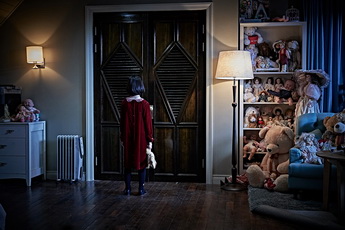 If you feel that the storyline is familiar, you are right. The Closet wears the influences from such American horror films as Poltergeist (1982), Don't Be Afraid of the Dark (1973) and They (2002) on its sleeves (the idea of a child's bedroom closet opening up to an alien world goes back to the classic Twilight Zone episode, "The Little Girl Lost"). Consequently, there is a bit of awkwardness in the film's setup where Korean reality does not quite match the American cultural assumptions underlying its premise, as in the somewhat unnaturally big size of In-a's bedroom and super-gloomy, aggressively Gothic ambience of their new house.
If you feel that the storyline is familiar, you are right. The Closet wears the influences from such American horror films as Poltergeist (1982), Don't Be Afraid of the Dark (1973) and They (2002) on its sleeves (the idea of a child's bedroom closet opening up to an alien world goes back to the classic Twilight Zone episode, "The Little Girl Lost"). Consequently, there is a bit of awkwardness in the film's setup where Korean reality does not quite match the American cultural assumptions underlying its premise, as in the somewhat unnaturally big size of In-a's bedroom and super-gloomy, aggressively Gothic ambience of their new house.
Nonetheless, the debuting director Kim Gwang-bin, formerly the sound director for Yoon Jong-bin's The Unforgiven (2005) and known for a series of award-winning shorts including Modern Family (2011) and How to Pick a Lock (2016), has excellent eyes for compelling visuals and knows how to maintain a brisk pace. Kim's direction does partake of a dash of video game stylistics, like younger Korean filmmakers are wont to do, but not to a seriously annoying degree. If anything, the film is surprisingly full of solid horror-action set pieces with a nod to the '80s Hellraiser-Nightmare on Elm Street grungy-but-colorful aesthetics. Either Kim or producer Jung Won-chan had the good sense (or is this the new standard now?) to list not just the production designer (Park Il-hyun, The Spy Gone North) but the set decorator (United 997, Forbidden Dream) and prop masters (Park Jun-yong & Yu Cheong, The Battle: Roar to Victory) in the title credits. Their contributions to the film's efficacy as a horror opus cannot be underestimated. Equally high-quality are Gwak Tae-yong and Hwang Hyo-gyun (Parasite)'s special makeup effects and Hong Jang-pyo (The Gangster, the Cop and the Devil)'s visual effects. The way, for instance, a character's grisly zombie makeup seamlessly blends into the CGI effects changing her into a "normal" countenance, is pretty impressive. To be sure, you should probably not expect something insanely elaborate or pathologically beautiful on the order of The Wailing (2016) or The Silenced (2015), but for a medium-budget horror film The Closet's technical achievement is nothing to sneeze at.
As for acting, Ha Jung-woo is not bad, although more subdued than usual; his toned-down performance actually works well in the context of the overtly melodramatic climax. Likewise, Kim Nam-gil refrains from overdoing the kind of "cocky SOB" shtick that has nearly ruined many Korean genre films, but all the same his character has little depth or volume, not enough to display any real acting skills on his part (I must say, to director-writer Kim's credit, I liked the surprising connection between Gyeong-hun and the unfortunately shaman shown in the prologue). In any case, the film is dominated by Kim Si-a (The House of Us) as the child ghost Myoung-jin, coldly contemptuous toward the hypocritical adults and believably vulnerable in her non-hostile mode. It would have been interesting had the film explored interaction among Myong-jin and the abducted children from her point of view, instead of devoting time to describe the boring technical details of Gyeong-hun's invocation-exorcism rituals.
Finally, The Closet's screenplay succumbs to a typically retrograde Korean mainstream view about the parenthood. I am glad that the film unequivocally critiques the soft attitude some Koreans have toward the practice of "family murder-suicide" but it still resorts to characterizing a "good parent" as someone who must constantly hover over a child. Despite having created a chance to cinematically discuss the unique difficulties of a single-father parenthood in the contemporary Korean setting, the film evades its responsibility by bringing in mother figure(s) as deus (dei) ex machina. I do not want to scold The Closet too much for doing this, considering way too many "It's all Mommy's fault!" plots and resolutions (the flip side of "It's all Mommy's love!" nonsense infusing many other movies) I have seen in Korean genre films. Having a Korean father reflecting on his indifference toward his daughter's emotional well-being, even if in the end a mere plot device to steer the film into its tear-jerking resolution, is surely a start. I guess The Closet could have been a much more powerful film, either as a family melodrama or a supernatural horror, but what we have is still agile enough for me to anticipate Kim Gwang-bin's next project with some goodwill. (Kyu Hyun Kim)
It all starts with a Louis Vuitton bag stuffed full of cash. A worker at a small sauna in the seaside city of Pyeongtaek finds it crammed in a locker while cleaning up after hours, after everyone has gone home. His financial situation is too desperate for him to simply hand it over to the police, but on the other hand, he's not quite reckless enough to take it home at once. Instead he puts it in a safe place where nobody else will find it, and considers his next move.
 We're familiar with stories of this type, and how the ensuing chain of events are fated to play out. What seems at first like a stroke of incredible good fortune will instead turn out to be quite the opposite. Still, the plot of Beasts Clawing at Straws is anything but predictable, partly because the canvas spreads out to encompass a wide spectrum of characters - a corrupt customs officer, an abused young woman working at a hostess bar, her scheming boss, an illegal immigrant from China, a gangster/loan shark with a mute enforcer, etc. - and partly because the screenplay combines all these cliches together into a complex and ingenious structure.
We're familiar with stories of this type, and how the ensuing chain of events are fated to play out. What seems at first like a stroke of incredible good fortune will instead turn out to be quite the opposite. Still, the plot of Beasts Clawing at Straws is anything but predictable, partly because the canvas spreads out to encompass a wide spectrum of characters - a corrupt customs officer, an abused young woman working at a hostess bar, her scheming boss, an illegal immigrant from China, a gangster/loan shark with a mute enforcer, etc. - and partly because the screenplay combines all these cliches together into a complex and ingenious structure.
Based on a novel by Japanese crime writer Keisuke Sone, Beasts Clawing at Straws premiered at the Rotterdam film festival, where it won the Special Jury Award in the Tiger Competition, and then (unfortunately) opened in Korea just as the COVID-19 pandemic started to hit the country with full force. The film might otherwise have reached many viewers both domestically and internationally, because it highlights some of the strengths of contemporary Korean cinema while making the most out of its talented cast.
Popular star Jung Woo-sung, as the customs officer Tae-young, is initially the character who attracts the most attention. Tae-young is clearly not the most honest individual, but his efforts to extract himself from a thorny situation at least earn our sympathy. But it's midway through the film, with the appearance of Jeon Do-yeon as the heartless Yeon-hee that the story really kicks into gear. Cunning, ruthless (as if the shark tattoo weren't enough of a giveaway), she's more than a match for any of the film's other crooks and cheats. Amongst a collection of overall very solid leading and supporting performances, Jeon Do-yeon's is the one that really lights up the screen.
Beasts is director Kim Yong-hun's first feature film, but it's nonetheless a slick commercial package that exudes confidence. Kim is effective at building tension and maintaining it until the very end of the running time. And thankfully, the end is worth waiting for -- not so much because of clever twists lying in wait to throw the viewer off balance, but because everything converges and resolves in a satisfying way. (Darcy Paquet)
Chan-sil is an independent film producer known for her long-term collaboration with a famous auteur director. But hardly have the film's opening credits rolled before the director dies of heart failure, and Chan-sil is left without a career. Whereas once, filmmaking consumed her every waking hour, she now finds herself with no work, no money and no personal life. How will she support herself? Can she avoid sinking into despair? Is there anyone she can lean on in a time like this? These are the sorts of questions that drive the plot of Lucky Chan-sil, a film that is realist in its world view, but also unpredictable, innovative and full of wit.
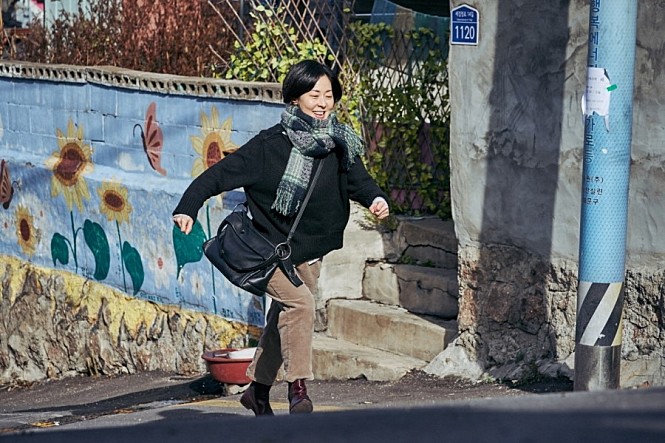 It doesn't take long for the audience to deduce that director Kim Cho-hee is a committed cinephile. If the opening credits, shot over traditional linen in the style of Ozu (and also Hong Sangsoo, whose films Kim produced from 2008 to 2015), aren't a clear enough giveaway, the fact that a reincarnation of Leslie Cheung plays a major role in the film removes all doubt. The world of the story is adorned with references and details that reflect the spirit of Korean cinephilia which reached its peak in the 1990s. Kim also displays an intimate familiarity with the Korean independent film scene: every interaction we see, whether it be between investor, producer, actor or crew member, feels true-to-life, sometimes depressingly so.
It doesn't take long for the audience to deduce that director Kim Cho-hee is a committed cinephile. If the opening credits, shot over traditional linen in the style of Ozu (and also Hong Sangsoo, whose films Kim produced from 2008 to 2015), aren't a clear enough giveaway, the fact that a reincarnation of Leslie Cheung plays a major role in the film removes all doubt. The world of the story is adorned with references and details that reflect the spirit of Korean cinephilia which reached its peak in the 1990s. Kim also displays an intimate familiarity with the Korean independent film scene: every interaction we see, whether it be between investor, producer, actor or crew member, feels true-to-life, sometimes depressingly so.
Chan-sil herself is a highly memorable character, brought to life by the performance of Gang Mal-geum. It's not that she isn't resourceful enough to deal with her situation. But her career accomplishments up to that point were all tied to the status of her now-deceased director. With him gone, she retains the relationships she had within the film industry, but she has lost her status. Not surprisingly, she more and more often finds herself feeling humiliated and alone.
The ghost of Leslie Cheung may be a projection of her loneliness, but he nonetheless proves to be good company (these scenes are some of the funniest in the film). There is also Chan-sil's landlord, played with her usual grace by veteran actress Youn Yuh-jung, who helps give her some perspective on what she's living through. But ultimately it may be the audience who is Chan-sil's most sympathetic observer.
At the 2019 Busan International Film Festival, Lucky Chan-sil was one of the Korean premieres that stirred up a particular sense of excitement, for the assuredness of Kim Cho-hee's direction and the film's unique charm. It won several prizes at BIFF, including the KBS Independent Film Award and the CGV Arthouse Award, and then went on to take the Audience Award at the Seoul Independent Film Festival in December. But just weeks before its scheduled theatrical release in early March, the COVID-19 pandemic hit Korea hard, with a frighteningly large cluster infection emerging in Daegu. The filmmakers decided to push ahead with the release anyway. Despite the fact that theater attendance as a whole plummeted and many theaters temporarily shut their doors, Lucky Chan-sil still managed to amass over 25,000 admissions - a good result for an independent release, even in the best of times. We'll never know much it might have earned if it had been released under normal circumstances, but as things stand, it is remembered as a rare bit of positive news for Korean cinema during the pandemic of 2020. (Darcy Paquet)
Han Yu-mi (Lee Se-young, Horror Stories 2, Duck Town) is a twentysomething college graduate struggling to find work. She is contacted by a local child-care service, and informed that she is now the legal custodian of her preschool-age half-sister Ji-u (Park So-yi). Yu-mi, nonplussed at her new responsibility, decides to deposit the child at a family friend Ms. Park's (the veteran TV actress Park Ji-young, also memorable in The Queen of Crime) mountainside resort hotel, momentarily closed during the off-season months. It seems that Ms. Park was a close friend of Yu-mi and Ji-u's mother, who had apparently suffered from mental illness and previously sought refuge in the hotel after divorcing Yu-mi's father. The half-sisters are warmly welcomed by Ms. Park, but soon Yu-mi begins to be disturbed by nightmares concerning her mother's suicide and begins to notice ghostly figures, especially in Room No. 405, somehow connected to her disjointed memory of her mother. When Ji-u disappears, Yu-mi uncovers the unsolved case of another disappearance of a teen girl in the vicinity. She must convince the skeptical police and Ms. Park that something evil, possibly supernatural, is afoot in the hotel.
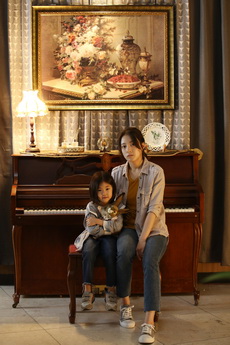 Any casual fan of the horror genre should immediately be able to name, based only on the synopsis above, at least two well-known horror films that Hotel Lake derives its inspiration from (Remember "Room 237?"). Thankfully, the debuting director Yoon Eun-kyung, formerly assistant director for Break Away (2010) and Queen of Walking (2016), does not pretend that she is inventing these familiar settings and plot devices for the first time, and spends most of her energy on generating creepy atmosphere and conventional yet strong fright scenes out of them. A 2017 Bucheon NAFF's It Project selection under the title Lingering, Hotel Lake had actually been completed in 2018 but was only released this year [2020], and then right smack in the middle of the COVID-19 pandemic. It is too bad that the film had to cope with these difficulties, as it in fact does its job rather well as a phlegmatic, female-oriented variant of K-horror. Although not as gorgeously affective as A Tale of Two Sisters (2003), or as thoughtful and metaphysically challenging as The Uninvited (2003), Hotel Lake features some highly effective terror sequences (my favorite among them is the "head drop" gag early in the film, worthy of a Roald Dahl vignette) and sucks in the viewers into its pervasive atmosphere of unease and dread. In that sense, the film is a decent throwback to the old days of J- and K-horror, when the long-haired ghost used to rule the day, without having to contend with the video-game aesthetics featuring herky-jerky, backpack-dancing demons and zombies.
Any casual fan of the horror genre should immediately be able to name, based only on the synopsis above, at least two well-known horror films that Hotel Lake derives its inspiration from (Remember "Room 237?"). Thankfully, the debuting director Yoon Eun-kyung, formerly assistant director for Break Away (2010) and Queen of Walking (2016), does not pretend that she is inventing these familiar settings and plot devices for the first time, and spends most of her energy on generating creepy atmosphere and conventional yet strong fright scenes out of them. A 2017 Bucheon NAFF's It Project selection under the title Lingering, Hotel Lake had actually been completed in 2018 but was only released this year [2020], and then right smack in the middle of the COVID-19 pandemic. It is too bad that the film had to cope with these difficulties, as it in fact does its job rather well as a phlegmatic, female-oriented variant of K-horror. Although not as gorgeously affective as A Tale of Two Sisters (2003), or as thoughtful and metaphysically challenging as The Uninvited (2003), Hotel Lake features some highly effective terror sequences (my favorite among them is the "head drop" gag early in the film, worthy of a Roald Dahl vignette) and sucks in the viewers into its pervasive atmosphere of unease and dread. In that sense, the film is a decent throwback to the old days of J- and K-horror, when the long-haired ghost used to rule the day, without having to contend with the video-game aesthetics featuring herky-jerky, backpack-dancing demons and zombies.
The predominantly female cast is very good. Lee Se-young, whom I remember as a radiantly beautiful preteen in Lovely Rivals (2004) and The Wonder Years (2007), has been quite busy in the TV-drama-dom throughout the intervening years: here, still beautiful but gaunt and slightly bug-eyed, she portrays a neurotic yet willful protagonist with restraint and precision, afraid that she has inherited her mother's insanity yet determined and smart enough to work toward finding the truth behind the supernatural shenanigans. Lee is ably supported by older female thespians, Park Ji-young as the seemingly generous and personable hotel manager, and the ordinarily glamorous Park Hyo-joo (Tazza: The Hidden Card, No Tomorrow) as a gone-to-seed stay-in maid, who hides her terror and despair behind alcoholic stupor and barbed-wire comments hurled at Yu-mi. Director Yoon also brings out a terrific performance out of the kid actor Park So-yi, who seldom appears to be "taking directions" when eloquently expressing anxiety of abandonment or genuine terror.
Moreover, writer-director Yoon manages to avoid the usual tendency of a Korean genre film to run for cheap melodramatics extolling mother's love. Hotel Lake turns a rather skeptical eye toward the maternal love that could be beautiful and self-sacrificing but also suffocating and pathologically obsessive, and in the end lets Yu-mi discover the value of her sisterly bond to Ji-u without indulging in any kind of tear-jerking "big climax." I rather liked this ambivalence mixed into the film by Yoon, along with some admittedly predictable plot developments and characterizations. Although decidedly low-budget, Hotel Lake, like many recent horror-fantasy films from Korea, has a distinctive if not startlingly original look, showcasing that bizarrely hybrid décor of the twentieth-century Korean architecture and interior furnishings, supervised by Production Designers Kim Gyeong-ho and Do Go-woon (Homme Fatale) and Set Designer Kim Nam-ho (Hellcats). The genuinely weird-looking cylindrical hotel that provides an indelible setting for the ghostly hauntings was apparently a real one, located in the hot springs resort Deoksan, South Chungcheong Province. Also notable are somewhat subdued but well-done special makeup effects by So Ji-hoon's SSOART (Zombie School) and Choi Jeong-in's music, equal parts languid lullaby and desolate dirge, referencing such ancient music as Seikilos epitaph.
I can understand the criticisms labeled at Hotel Lake that it is in the end too unoriginal and predictable, but as I have stated before, in a highly conventionalized genre such as Westerns or East Asian ghost films, how the clichés have been deployed and realized are often more important than the novelty values of the premises or core ideas. Yoon Eun-kyung's largely female-driven genre effort fulfills the requirements for a creep-out horror opus and then some: it does nothing to sully the current reputation of South Korea as the place to go for red-blood horror films that do what horror films are expected to do. (Kyu Hyun Kim)
Kim In-nam (Hwang Jung-min, The Spy Gone North) is a former secret agent from a defunct black ops department, now an assassin for hire. During the opening sequence, he brutally executes a Japanese yakuza boss, supposedly his last job before retirement into a tropical country (for some reason Panama in this film). Unfortunately, he learns that his former paramour Young-joo (Choe Hee-seo, Anarchist from Colony) was murdered in Bangkok and their ten-year-old daughter Yu-min (Park So-yi, Hotel Lake) kidnapped by a child-trafficking operation. In-nam leaves to Bangkok to investigate, only to realize that the yakuza boss he killed earlier was a Korean-Japanese and his brother Rei (Lee Jung-jae, Svaha: The Sixth Finger), a psychotic thug with a penchant for gutting his victims like pigs in an abattoir, is determined to locate and butcher him, along with everyone else he has any relationship with.
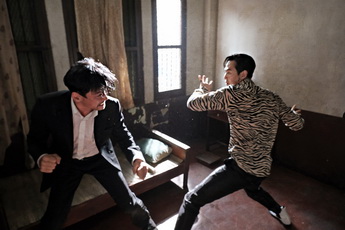 Written and directed by Hong Won-chan, who had debuted with an interesting psychological horror Office, Deliver Us from Evil is a gorgeously filmed, meticulously executed but emotionally distant, almost stunted, action thriller. The plot and characterization are as hackneyed as one could imagine, and this seems to be Hong's intention. He never bothers to explain certain details about the characters and their backgrounds: we never find out what In-nam's government job exactly was, and why all the agents were abrupted terminated, for instance. Nor does he set his film in an identifiable temporal or spatial frame: Thailand here is merely a generic Third World country, very much like Afghanistan, Russia or other nations serving as killing grounds for white action heroes such as Rambo. The profligately tattooed Japanese yakuza are even more stereotyped and stylized, almost to the point of abstraction. Overall mood of the film is dark, somber and unromantic, but there is just a hint of ironic distancing to the proceedings, amplified by the bizarrely clichéd and pseudo-theatrical dialogue spit out by In-nam and Rei. Hong's approach does remind the viewer of Kitano Takeshi's poker-faced directorial style, although minus the latter's Zen-like aesthetic control.
Written and directed by Hong Won-chan, who had debuted with an interesting psychological horror Office, Deliver Us from Evil is a gorgeously filmed, meticulously executed but emotionally distant, almost stunted, action thriller. The plot and characterization are as hackneyed as one could imagine, and this seems to be Hong's intention. He never bothers to explain certain details about the characters and their backgrounds: we never find out what In-nam's government job exactly was, and why all the agents were abrupted terminated, for instance. Nor does he set his film in an identifiable temporal or spatial frame: Thailand here is merely a generic Third World country, very much like Afghanistan, Russia or other nations serving as killing grounds for white action heroes such as Rambo. The profligately tattooed Japanese yakuza are even more stereotyped and stylized, almost to the point of abstraction. Overall mood of the film is dark, somber and unromantic, but there is just a hint of ironic distancing to the proceedings, amplified by the bizarrely clichéd and pseudo-theatrical dialogue spit out by In-nam and Rei. Hong's approach does remind the viewer of Kitano Takeshi's poker-faced directorial style, although minus the latter's Zen-like aesthetic control.
Like his previous film, Hong displays an exceptional eye for detail as well as propensity for delivering arresting visual imagery, and it is the film's countenance that I must cite as its chief strength. The cinematography supervised by Alex Hong Kyung-pyo (Parasite, The Wailing) is by turns heartbreakingly exquisite and brilliantly illustrative, sometimes suggesting through hues and textures of the images the emotional contents of a scene, not always well conveyed through dialogue or turns in the plot. Production designer Jo Hwa-sung (The Man Standing Next), special effects makeup by CELL and visual effects by Demolition are all in top form. The action sequences supervised by Lee Geon-moon uses some editorial tricks such as stop-motion cuts that radically changes the speed of a blow (a la Tsukamoto Shin'ya's Tokyo Fist) but otherwise are suitably impactful. Especially worth noting is an industrial noise-like electronic score by Mowg (Unstoppable, Exit) contributing much to preventing occasional excesses of fight choreography or character interaction from slipping into ridiculousness.
Given the (perhaps deliberately) clichéd and archetypal characters they were asked to play, it is not surprising that neither Hwang nor Lee, despite their combined thespian prowess, can quite make their personas compelling, sympathetic or fun. In-nam is like one of those retired British MI6 agents in unremarkable Anglo-American thrillers who suddenly show up in a former British colony, say, Hong Kong or India, and make messes out of the local society in the course of resolving some personal issues involving his family. Perhaps Hong meant to depict the psychology of an emotionally calloused assassin through In-nam, but the restraint he puts on Hwang Jung-min's expressive acting is no help. The latter is not allowed to fully bring his tools of the trade that could render obstinate and even repellent characters charming or sympathetic, as he did in Veteran or Asura: The City of Madness. Lee Jung-jae is similarly sabotaged by his rather over-the-top yakuza personification. It is a testament to Lee's acting ability and charisma that he does not appear drowned in that huge white overcoat or look like a Groot after a bad diet smoking those black pencil cigarettes in repose.
However, the film's surprise acting winner is Park Jung-min (Bleak Night, Time to Hunt) who plays a transgendered Korean expatriate living in Thailand, a borderline offensive stereotype for sure, but at least providing much needed counterpoints to In-nam's lugubrious stoicism and Rei's randomly articulated psychosis. Park is actually quite good as seemingly feckless but ultimately resilient Yu-i, probably because his role allows for normal human emotions. Yu-i is the only character in the film whom I could really root for, and Hong deserves credit for not going (another clichéd) route of slaughtering a sympathetic figure for the sake of showing off to the audience that he means business.
Deliver Us from Evil is a curious film, equal parts obtusely cliché-ridden and impeccably stylized, with top-notch technical specs but two inert, uninteresting protagonists in the center of its narrative. It is certainly beautiful-looking and slickly made, with some high-quality action sequences that will likely satisfy fans of the Asian action genre in which the preferred tools of bodily destruction are knives and machetes. However, the film ultimately left me cold and unmoved: as I was watching its overblown climax, I kept imagining another movie in which a female (or transgender?) Thai hero beat the stuffing out of the suit-clad, English-speaking Korean interlopers blasting machine guns at the storefronts, throwing hand grenades into the promenade and otherwise making lethal pests out of themselves. I doubt that movie could be as technically accomplished as Deliver, but I somehow feel that I would probably enjoy it more. (Kyu Hyun Kim)
Mi-young is the owner of a popular twisted donut shop in an outdoor food market. She leads an active but modest home life with her computer technician husband and 10-year old daughter, until the day her husband pulls the sticker off the inside of a bottle cap and sees that they have won a free trip to Hawaii. Mi-young and her family are shocked and overjoyed -- they can hardly believe their luck. But what seems at first to be incredibly good fortune turns out to be something else. We're all familiar with vacation plans that go terribly wrong. But having your flight to Hawaii kidnapped by North Korean terrorists seems almost impossibly unlucky.
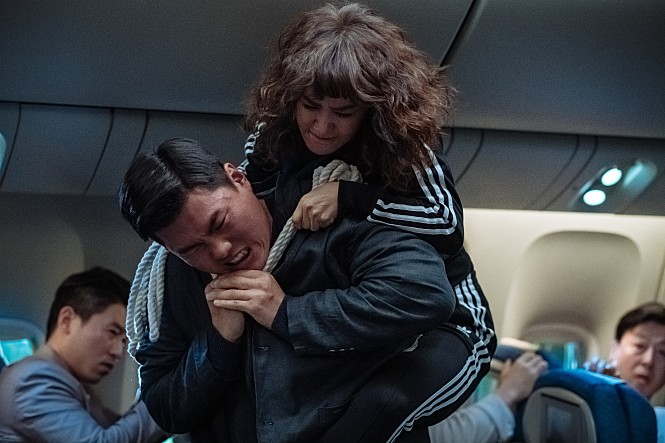 There is fun to be had in OK! Madam if you can stand a little silliness. Not all of the jokes land, and the plot takes a few hard turns, but director Lee Cheol-ha (Insane, Love Me Not) keeps the energy at a high level, and somehow manages to hold everything together. This is a movie that never takes itself too seriously, and isn't above reveling in some outlandish slapstick, but it's also genuinely funny. (The title, incidentally, is an homage to Hong Kong director Corey Yuen's 1985 action comedy Yes, Madam.)
There is fun to be had in OK! Madam if you can stand a little silliness. Not all of the jokes land, and the plot takes a few hard turns, but director Lee Cheol-ha (Insane, Love Me Not) keeps the energy at a high level, and somehow manages to hold everything together. This is a movie that never takes itself too seriously, and isn't above reveling in some outlandish slapstick, but it's also genuinely funny. (The title, incidentally, is an homage to Hong Kong director Corey Yuen's 1985 action comedy Yes, Madam.)
At the center of the film is veteran actress Uhm Jung-hwa, a rare example (together with Kim Hye-soo) of a woman who has been headlining films in Korea for three decades. She is best known for romantic comedies and relationship dramas such as Marriage is a Crazy Thing (2002), Singles (2003), Seducing Mr. Perfect (2006), Dancing Queen (2012) and Wonderful Nightmare (2015). But here she takes on the action comedy genre with determined enthusiasm, training at an action school and bringing her signature energy to this madcap story. Director Lee surrounds her with a capable cast, most memorably Park Sung-woong as her supportive husband, but there are also many character actors who leave a big impression in their limited screen time.
There is an art to nutty comedy. It's far more challenging than it looks. Korean cinema is littered with examples of comedies that try to be amusing, but that fail in the end to properly relax and enjoy themselves. That, thankfully, is not a problem with OK! Madam. What it lacks in plausibility, it makes up for in good-natured fun. (Darcy Paquet)
At the age of 12, Sun-yu has already suffered more loss than most middle-aged adults have had to live through. Her father's decision to kill himself leaves her awash in grief, and confused. Her mother decides that the two of them will move to a new city where nobody knows them. In this way Sun-yu enters a new school, and the other students are left to assume that her reserved, unsmiling manner is just an inherent part of her character.
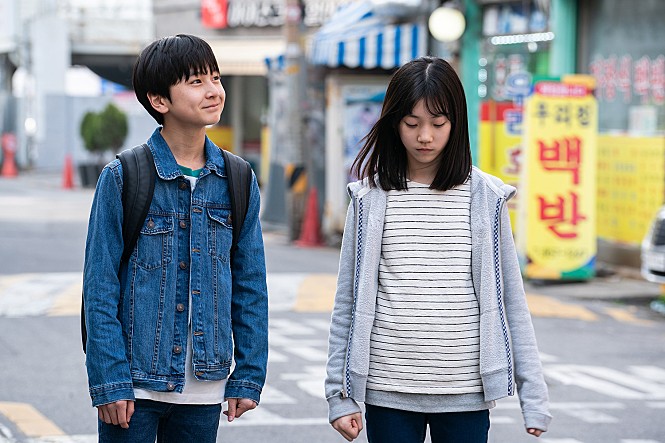 One boy among her classmates takes special notice of her. Jeong-guk is seemingly opposite in every way to the soft-spoken Sun-yu. He fools around in class, and seems blissfully unaware of her subtle "leave me alone" vibe. But though she doesn't realize it, Jeong-guk is exactly the kind of person that Sun-yu needs in her life. His steady presence gradually becomes something she can rely on.
One boy among her classmates takes special notice of her. Jeong-guk is seemingly opposite in every way to the soft-spoken Sun-yu. He fools around in class, and seems blissfully unaware of her subtle "leave me alone" vibe. But though she doesn't realize it, Jeong-guk is exactly the kind of person that Sun-yu needs in her life. His steady presence gradually becomes something she can rely on.
But life don't get any easier at home. Sun-yu's mother is erratic in the best of times, and her desperate economic situation starts sliding from bad to worse. The pressure of unpaid debts and an unreliable job leave her more and more vulnerable to despair. And in no way does she try to shield any of this from Sun-yu. Faced with her mother's unfiltered emotions on a daily basis, Sun-yu starts to worry that her mom might opt for the same tragic choice as her dad.
Please Don't Save Me is at times heartwarming and funny, effectively capturing the everyday life of its young heroine. Much of it takes place during the languid hours after school, when Sun-yu and Jeong-guk slowly start to become friends. The performances of the child actors Jo So-yeon and Choi Ro-woon are appealing and natural - even more so than that of the adult actors, in fact. But the film carries a weight as well. Though it never tips over into being overbearing, viewers should expect to be carried through a wide range of emotions in the course of this story.
Debut director Jung Yeon-kyung says that she wrote this screenplay after reading about an awful tragedy that took place in the city of Daegu involving a mother and her daughter. Please Don't Save Me is not a dramatization of that story, but instead an effort on her part to work through the issues it raised, and to imagine another way that events might have played out. The end result is a memorable film that is unusual in tone. It is awash in the colors of mainstream entertainment, but it contains a seriousness of purpose that is rare in films about 12-year-old kids. In that sense it's a hard movie to market, which, combined with the pandemic, meant that few people ultimately got to see it in Korea. This is a shame... it's a movie that's worth discovering, and remembering. (Darcy Paquet)
So-hee (Lee Jung-hyun, Peninsula) is a thirtysomething housewife married to a handsome and wealthy husband Man-gil (Kim Seong-oh, Secret Zoo), a gourmand and a saccharine Prince Charming. One day she stumbles on the evidence that he has been two- (three-, four-, multiple-) timing her. Despondent and enraged, she seeks help from a private investigator Dr. Jang (Yang Dong-geun, Perfect Game, Fengshui) who for some reason looks like a human broccoli (?!). The latter convinces So-hee that her husband is a member of a near-immortal, (literally) blue-blooded alien species called the Unbreakables (?!?), among whose uncommon habits is guzzling diesel fuel for tonic effects at a gas station, and that she is in line to be murdered so that he could happily continue his Bluebeard-like lifestyle. Apparently many too-good-to-be-true tall and handsome Korean men are in reality members of the Unbreakables, including the movie star Jung Woo-sung (?!?!). Seeking help from Dr. Jang and her high school friends, the butcher-shop-owning divorc ée Sera (Seo Yeong-hee, The Wrath) and the vainglorious B-movie actress Yang-seon (Lee Mi-do, The Beauty Inside), So-hee plans to strike back at her husband. However, Man-gil is more difficult to kill than a cockroach in a rundown motel: electrocution, being buried alive, being dropped from a 50-feet high cliff — nothing seems to faze him. Moreover, there seems to be a power struggle going on among the Unbreakables, with Man-gil and his cronies hunted down by a bunch of men in black.
 Night of the Undead marks the return after eight years of writer-director Shin Jung-won (To Catch a Virgin Ghost, Chaw, The Ghost Sweepers), and those familiar with his, urr, "tastes" would not be surprised at all by the general wackiness of the above description of this movie's (alleged) plot. Trust me, the movie itself is a lot weirder than what any synopsis would indicate. While Shin's sui generis wackoid sensibility liberally displayed in his previous films — Who could ever forget Chaw's wild pig hunter's bulldog telepathically engaging in droll conversation with his owner... in Russian? Or a teenage psychic carrying a row of cheese sticks like ninja shuriken inside her vest in Ghost Sweepers?— is still (thankfully) intact in Night, his latest project is much more slickly put together, with elegant production designs (for instance, Man-gil's fully automated apartment controlled by an Alexa-like AI) and sophisticated special effects, relatively speaking. The plot is also unusual for Shin, possibly because it might have originated as a more conventional crime thriller from the co-screenwriter Jang Hang-jun (Forgotten), in that it focuses on the rage of three female characters, So-hee, Sera and Yang-seon, toward their male counterparts, once they realize that to the latter they are no more than machine parts of a well-heeled bourgeois life. As such, there is a sense of mismatch between pseudo-Men in Black shenanigans involving alien invaders and the domestic comedy thriller in which the spouses make gooey eyes at one another while hiding a hatchet or a poison-filled hypodermic in their hands.
Night of the Undead marks the return after eight years of writer-director Shin Jung-won (To Catch a Virgin Ghost, Chaw, The Ghost Sweepers), and those familiar with his, urr, "tastes" would not be surprised at all by the general wackiness of the above description of this movie's (alleged) plot. Trust me, the movie itself is a lot weirder than what any synopsis would indicate. While Shin's sui generis wackoid sensibility liberally displayed in his previous films — Who could ever forget Chaw's wild pig hunter's bulldog telepathically engaging in droll conversation with his owner... in Russian? Or a teenage psychic carrying a row of cheese sticks like ninja shuriken inside her vest in Ghost Sweepers?— is still (thankfully) intact in Night, his latest project is much more slickly put together, with elegant production designs (for instance, Man-gil's fully automated apartment controlled by an Alexa-like AI) and sophisticated special effects, relatively speaking. The plot is also unusual for Shin, possibly because it might have originated as a more conventional crime thriller from the co-screenwriter Jang Hang-jun (Forgotten), in that it focuses on the rage of three female characters, So-hee, Sera and Yang-seon, toward their male counterparts, once they realize that to the latter they are no more than machine parts of a well-heeled bourgeois life. As such, there is a sense of mismatch between pseudo-Men in Black shenanigans involving alien invaders and the domestic comedy thriller in which the spouses make gooey eyes at one another while hiding a hatchet or a poison-filled hypodermic in their hands.
Which is not to say Shin's wrangling of main actors is not good. The main characters are perfectly cast. Lee Jung-hyun is equal parts hilarious and sympathetic as a pretty but mousy, shrinking-violet housewife. She and Seo Yeong-hee could have easily exchanged their roles considering their conventional images, but Seo brings an unexpected level of pathos and humanity to a role that could have easily been a cartoon-version of a hard-drinking, hatchet-wielding "tough auntie." Kim Seong-oh, usually cast as a nervous villain with a chip on the shoulder, is also a revelation as a brown-eyed, extravagantly expressive "alien" husband, displaying a dancer's grace and agility while listening to the strains of
As has been the case with Shin's previous films, Night does not quite cohere together as it should. Some parts of the narrative and characterization feel lumped together without carefully being blended in: the internal disputes among the Unbreakables are not well explained, and as such, their intervention into Man-gil's quarrels with his wife and her friends feels a bit like a deus ex machina descending. Shin also tends to sacrifice pacing or narrative economy if he could cram in any set piece that perks up weirdness quotient or gives actors something interesting to do. As a result, a few sequences tend to drag, such as the women's frazzled interaction with the local cops determined to bust them for DUI. As I have pointed out above, the technical specs are above average, but the "comical" score Shin employs in some scenes sounds like elevator Muzak (although I must say the Billie Eilish song bad guy was a smart choice, and this is the only Korean film I have seen in the last two years that actually has a bona fide music score coda lasting at least five minutes after the end credits: kudos to Shin, musical directors, or both, for having an old but good taste!). Personally, I wish he had given himself a chance to further elaborate physiology and culture of the aliens, or at least bring the wacky-SF portion and the wacky-zombie-spouse-horror-comedy portion of the film into a better balance.
Night of the Undead is a one weirded-out SF comedy, plenty entertaining and uproariously funny for those with the right sensibility. It feels for all intents and purposes like a modern update of those '70s-'80s European SF-horror hybrids in which glamorous and/or stressed women, played by such actresses as Mimsy Farmer or Carroll Baker, are menaced by weirdly localized threats, whether they are aliens, vampires, or werewolves (or aliens that look like werewolves, as in Norman J. Warren's Prey). If this description strikes a chord in your heart, you are in for a treat. Even if it merely makes you scratch your head, you could still try Night out to check out one of the most distinctive voices still working in Korean genre cinema.
(Kyu Hyun Kim)
Tae-in and Chang-bok are friends and co-workers who seem, at least in some ways, to perfectly complement each other. The chatty elder man Chang-bok gives Tae-in brotherly advice on life and religion as they work on various odd jobs. Tae-in, for reasons not fully explained, does not talk, but he is reliable and loyal to his friend. The two form an easy camaraderie as they partner on their work: selling eggs, transporting agricultural goods, and disposing of bodies killed by a local criminal organization.
Hong Eui-jeong's remarkable debut film attracted much critical praise when it opened in Korea in the midst of the pandemic. One telling sign of directorial talent is the ability to precisely control tone. Voice of Silence strikes an unusual tone from the very start, juxtaposing the placidity of its rural setting with the occasional homicide and an assortment of odd characters. There is an understated humor here as well, though it is often buried under several other emotional layers. The moral universe of the film may seem bleak, and few of the people who populate this work are what you would call innocent, but in the course of the narrative there proves to be a crucial difference between the callous and the compassionate.
Aspects of this film that have drawn critical attention range from its cinematic sophistication and its nuanced story to its memorable settings, but particular praise has been heaped on its performances. Over the years, actor Yoo Ah-in has added to his increasingly impressive filmography with acclaimed turns in The Throne (2014), Veteran (2015), Burning (2018), Default (2018), and #Alive (2020), but in this film his silent acting is particularly expressive. He partners well with the veteran character actor Yoo Jae-myung, but his chemistry with the talented child performer Moon Seung-ah is particularly noteworthy. Moon injects a kind of fire into the story, and from the moment she appears, where it will end up is anybody's guess.
Director Hong is an exciting talent. She majored in film at the Korea National University of Arts, and later studied at London Film School, where she directed numerous shorts and graduated in 2013. Voice of Silence has netted her numerous awards, including Best New Director at the Blue Dragon Film Awards, Best Director at the Baeksang Arts Awards, and the Cheval Noir Award for Best Feature at the 2021 Fantasia International Film Festival in Montreal. Many people in the Korean film industry will be looking forward to her second feature.
(Darcy Paquet)
 It's perhaps because of this no-nonsense efficiency that they are asked one day to take on a job that goes beyond their usual remit. The gangsters have taken a young girl for ransom, but because of some unexpected circumstances, she needs to be held for an extra day or two until the money can be collected. Chang-bok reluctantly agrees to look after the girl, and they bring her to Tae-in's home in the countryside. By this point, viewers who have seen enough films will know that in the movies, a simple kidnapping job is never resolved simply.
It's perhaps because of this no-nonsense efficiency that they are asked one day to take on a job that goes beyond their usual remit. The gangsters have taken a young girl for ransom, but because of some unexpected circumstances, she needs to be held for an extra day or two until the money can be collected. Chang-bok reluctantly agrees to look after the girl, and they bring her to Tae-in's home in the countryside. By this point, viewers who have seen enough films will know that in the movies, a simple kidnapping job is never resolved simply.